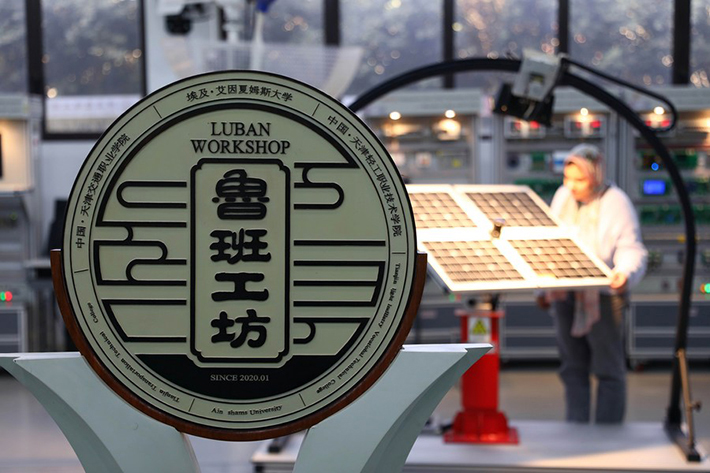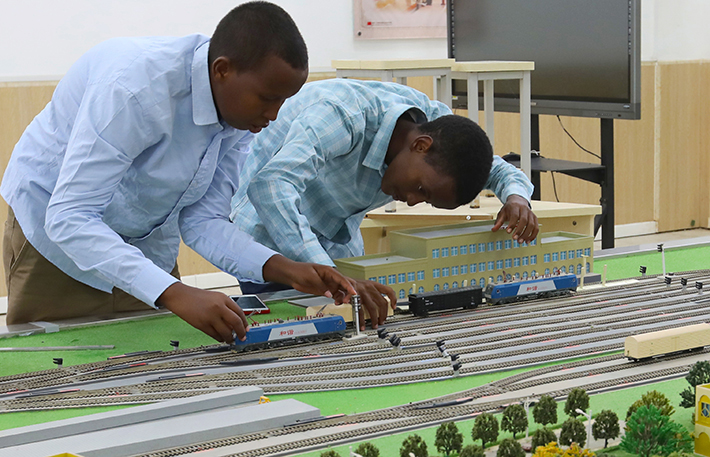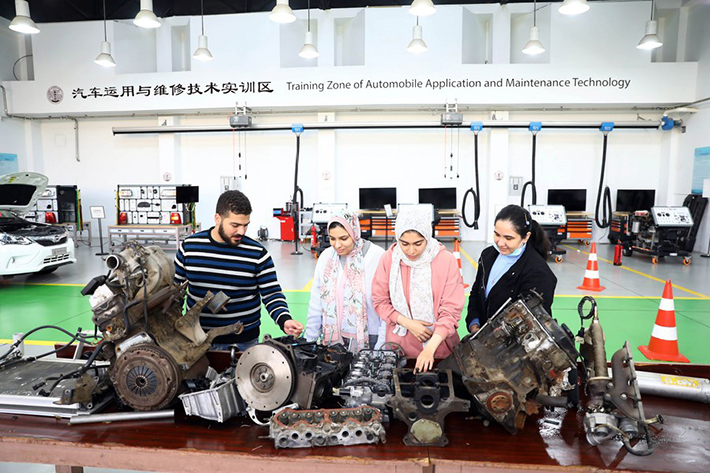|
||||||||||
| Home Nation World Business Opinion Lifestyle ChinAfrica Multimedia Columnists Documents Special Reports |
|
||||||||||
| Home Nation World Business Opinion Lifestyle ChinAfrica Multimedia Columnists Documents Special Reports |
| ChinAfrica |
| Improving Vocational Skills |
| China’s Luban Workshop cultivates skilled workforce in Africa |
| By Xia Yuanyuan 丨VOL. 15 May 2023 ·2023-04-19 |

Photo shows the logo of the Luban Workshop at Ain Shams University in Cairo, Egypt, on 21 December 2022
More than four years have passed, but Wang Lin, a teacher from Tianjin Railway Technical and Vocational College, still remembers a small episode that took place in July 2018 when he was in charge of the Luban Workshop at Ayutthaya Technical College in Thailand.
A college principal in Thailand asked him, “When our Luban Workshop began operation, did Lu Ban come?” Wang laughed and explained to his Thai counterpart that Lu lived from 507 to 444 B.C., and was famous for creating numerous carpentry and agricultural tools, as well as traditional architecture and military machinery.
“Luban represents China’s professional spirit, spirit of craftsmanship, the pursuit of excellence, and the courage to innovate,” he said.
Named after Lu Ban, the workshop was initiated by north China’s Tianjin Municipality and designed to impart technical skills that can help college students to meet the job requirements of the emerging global market.
China’s first overseas Luban Workshop was set up in Ayutthaya Technical College in Thailand by Tianjin Bohai Vocational Technical College in March 2016.
Now, the programme has become a symbol of Chinese vocational education exchanges and cooperation in the world. To date, 27 Luban Workshops have been established in countries along the Belt and Road, according to China’s Ministry of Education. Tianjin’s vocational colleges have taken the lead, setting up 21 workshops in 20 countries.
In September 2018, Chinese President Xi Jinping pledged in his keynote speech at the opening ceremony of the Beijing Summit of the Forum on China-Africa Cooperation (FOCAC) that China would “set up 10 Luban Workshops in Africa to provide vocational skills training to African youth.”
To date, China has established a total of 12 Luban Workshops in 11 African countries, including Kenya, South Africa, Mali, Nigeria, Egypt, Uganda, Cote d’Ivoire, Madagascar, and Ethiopia. The Luban Workshop has filled the gap in vocational education cooperation between China and Africa.
Capacity building
In the Luban Workshop in Djibouti, dozens of students are taught to drive train on a simulation machine.
Aisha Abdoulkader Abdallah was in the first batch of enrolled students at the workshop. Abdallah has had a special interest in railway since childhood. She used to play by the track when she was a child. She said that nothing makes her happier than a dream come true.
“I am proud to study at the workshop, because there was no such type of institution before,” Abdallah said in an interview with Xinhua News Agency.
Located near the bustling Djibouti Port, one of the most important ports in Africa, the workshop, jointly built by Tianjin Railway Technical and Vocational College and Tianjin First Commercial School, was inaugurated in March 2019. It was the first of its kind in Africa at that time.
Four majors related to railway and business management are offered in the first phase of the project, with the aim to help to foster local talents for the railway industry in the African country.
In the workshop, students can see on a three-dimensional sand table a reproduction of the operation of locomotives on each track of the Chinese-built Addis Ababa-Djibouti Railway. Together with her classmates, Abdallah learnt railway-related knowledge through an internship programme at a station in Djibouti on the Addis Ababa-Djibouti Railway.
At the end of 2022, the first batch of 24 students graduated from the workshop to support the development of the Djibouti port logistics economy, and help the country to realise its Vision 2035, which aims to turn the country into a regional logistics and commerce centre.

Students learn at the Luban Workshop at Djibouti Industrial and Commercial School in Djibouti City, Djibouti, on 19 September 2022
Filling talent gap
According to a survey by Allianz Global Corporate & Specialty, an international financial services provider, attracting and retaining skilled workers is a global challenge and Africa is not an exception. There is increased demand for highly skilled workers. Africa faces a shortage of skilled workers across various sectors ranging from logistics, agriculture, tourism, health care, IT, infrastructure, finance and banking to construction.
During the Eighth FOCAC Ministerial Conference held in Senegal in November 2021, President Xi announced the launch of nine programmes for China-Africa cooperation over the next three years, one of which is about capacity building.
Luban Workshops in Africa are disseminating knowledge about Chinese models, equipment and solutions. More young Africans are eager to improve their skills through the workshops and find new opportunities for employment and development.
At present, the Luban Workshops in Africa offer 27 majors that cover 11 categories, the China Daily reported. Students are trained and equipped with targeted skills in collaboration with the enterprises they will work at after graduation.
The priorities of each workshop are set in accordance with the development needs of the host country. For instance, in Djibouti, the Luban Workshop focuses on training railway operation personnel. In Ethiopia, the workshop aims to improve the teaching-learning process in the areas of mechatronics, robotics, and artificial intelligence.
The Luban Workshop in Mali offers practical courses on traditional Chinese medicine, which will fuel the growth of traditional medicine in Mali. It is also expected to promote development and innovation of the medicine and bolster cooperation in health care between China and Mali.
The workshop in Tanzania aims to provide high-quality education and teaching resources for the country’s automotive engineering and other related majors, and to cultivate talents proficient in automotive-related skills.
The workshop in Ain Shams University in Cairo, Egypt, provides trainings in computer numerical control installation, new energy technology and automobile application and maintenance technology.

Trainees receive training at the automobile application and maintenance technology training area of the Luban Workshop at Ain Shams University
in Cairo, Egypt, on 21 December 2022
Broader impact
Many of the youngsters attending the workshop hope that by acquiring these vital vocational skills, they can not only realise their dreams, but also help to drive economic and social development in their home countries.
Tabor Tamiru, who attended the Luban Workshop in Ethiopia, has now became a full-time teaching assistant there.
Before graduating from Addis Ababa Science and Technology University in electrical and mechanical engineering, Tamiru was involved in a three-month internship programme at the workshop in 2021.
Tamiru said he felt excited to work as a teacher at the workshop and instruct students in local language, as some of them are not good at English or other languages.
“In general university, we could only learn the theory part. But in the workshop, we can get started with the practice,” he said in an interview with China Central Television.
Established by China’s Tianjin University of Technology and Education inside the premises of Ethiopian Technical University, the Luban Workshop serves as a centre of excellence in four major areas: industrial sensor technology, mechatronics technology, industrial control technology and industrial robotics technology.
Having first-hand experience at the facility would help students to gain more technical knowledge and skills, ultimately boosting their confidence in applying their advanced knowledge in future endeavours, Teshale said.
At the same time, several local teachers from the Luban Workshop in Ethiopia were invited to attend trainings in the Tianjin University of Technology and Education. With a passion for robotics, Abakuma Getachew Belay, one of the teachers, said he wanted to use his skills to help to develop his country’s manufacturing industry.
“Nowadays, all the manufacturing sectors use robots and sensors. The robotics knowledge will help my country’s modernisation. The knowledge we gain here can be applied to many industries,” Belay said in an interview with CGTN.
|
||||
| About Us | Contact Us | Advertise with Us | Subscribe |
| Copyright Beijing Review All rights reserved 京ICP备08005356号-5 京公网安备110102005860号 |